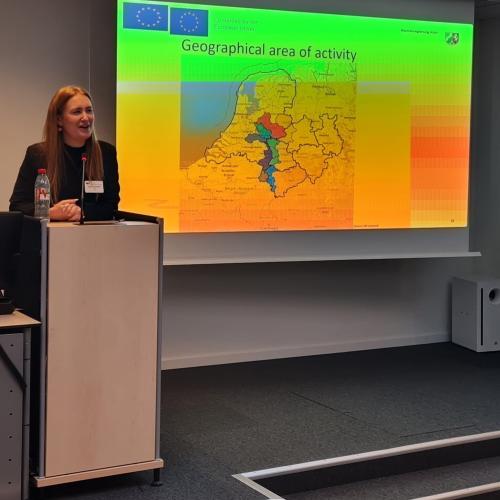Civil protection stakeholders sometimes face challenges with communication and awareness between different levels of governance. National authorities may be unaware of local initiatives, for example, while local actors may lack insight into national activities and priorities. There can also be a lack of awareness of civil protection structures and procedures of other countries in border regions. This disconnect can potentially hamper the alignment of efforts and the scaling up or maximising of disaster preparedness initiatives to achieve long-term impact.
To find out more how one project is dealing with the coordination across governance levels, we interviewed Sarah Jürges, project coordinator of CivPro-LiNC.
Overview of the CivPro-LiNC Project
Sarah works at the Bezirksregierung Köln, the Cologne district government, where she serves as the acting head of the department for non-police disaster prevention. With a background in law, she leads various aspects of disaster prevention, including fire protection, emergency medical services, and cross-border disaster management.
The CivPro-LiNC - Civil Protection Liaison Network Concept project addresses the critical role of liaison officers in cross-border disaster management. The project focuses on enhancing cooperation and coordination between civil protection agencies to improve disaster management and response, fostering a culture of common preparedness and enhancing the capacity of civil protection agencies to work together effectively.
Sarah explained that experience has shown liaison officers play a vital role in facilitating communication between different authorities during disasters, yet their responsibilities are often shaped by individual experience and commitment rather than standardised training. For this reason, the project aims to develop a basic training course for liaison officers, setting a minimal common standard for their role.
The training is designed in collaboration with the project’s partners: the Institute of Fire Services NRW, the Dutch Institute for Public Safety (NIPV) and the International CBRNE Institute Belgium (ICI), with the final phase of the project that includes a tabletop exercise based on a CBRNE (Chemical, Biological, Radiological, Nuclear, and Explosive) scenario to assess the effectiveness of the training.
The project targeted liaison officers from North Rhine-Westphalia and the Netherlands, with the long-term goal of expanding to other border regions, such as Lower Saxony and Belgium.
Preparation of the proposal
The CivPro-LiNC project consortium emerged from institutions that had previously expressed an interest in developing training modules for liaison officers but who lacked the opportunity and resources to realise this vision. Project partners met at the Trilateral Conference on Civil Protection (which is organised every two years between the Netherlands, North-Rhine Westphalia and Lower Saxony), where they came together to develop the project proposal based on their shared interest.
First six months – Assessing the needs
A key strategy of CivPro-LiNC was dedicating the first six months exclusively to assessing the needs of local authorities: the project consortium conducted structured interviews and workshops with local emergency responders and municipal representatives to identify knowledge and skills required for the training modules.
Sarah highlighted that this participatory approach helped uncover gaps that might have otherwise been overlooked, empowering local authorities as co-creators rather than just recipients of the training.
Sarah emphasised that involving local authorities from the very beginning ensured that the project responded to the real needs of liaison officers.
Regular meetings played a crucial role in ensuring smooth communication among partners. Sarah explained that monthly video conferences, with increased frequency during critical phases, kept the project proposal development phase on track. One particularly effective method was the Writing Bootcamp, where partners met in person for three days to hold in-depth discussions and make rapid proposal drafting progress. Sarah strongly recommended such bootcamps for future applicants, noting their role in accelerating the drafting process and fostering collaboration.
Communication between national and local level (Land)
As Sarah describes, the CivPro-LiNC project was supported through continuous communication between the national and local level (Länder level). National CP authorities played a crucial role in advising the district government on Länderlevel during the proposal phase and also keeping the competent national CP authority informed, thereby facilitating and accelerating administrative steps like the signature of the letter of support; steps that within the usual workflow through local and national administration levels can take a lot more time.
Sarah explained that the Interior Ministry of North Rhine-Westphalia (NRW) became aware of the KAPP Grant through national channels and actively encouraged local stakeholders to attend an information session organised by DG ECHO. This proactive involvement from the national authorities helped bridge the information gap and motivate local stakeholders to participate in the funding process.
Throughout the project proposal development, national authorities remained closely involved, regularly participating in monthly meetings and sharing insights on the project’s progress. Sarah noted that this consistent two-way communication aligned efforts across governance levels, creating a sense of shared responsibility and strengthening the overall project outcomes.
Tips for KAPP applicants
Sarah advised that the application process for the KAPP Call is time-intensive and requires thorough preparation. She stressed the importance of starting early, defining a clear project idea, and building a strong consortium of partners. Applicants should allocate sufficient time to draft the project proposal, including detailed work packages, timelines, and budgets. Collaboration and clear communication among partners are essential, and in-person writing bootcamps can be an effective method to speed up the drafting process and improve the quality of final proposals.
Long-term sustainability
To ensure the long-term sustainability of the project outcomes, CivPro-LiNC tailored the training course to the needs identified during the needs assessment phase. Sarah explained that the ongoing involvement of national authorities and regular consultations during monthly meetings increased the likelihood that the training module could be integrated into broader disaster preparedness frameworks or eventually scaled up with national government support.
Furthermore, the participatory approach fostered a sense of ownership among national CP authorities, local authorities and liaison officers which strengthened the sustainability of outcomes.
Author: Victoria Dreznjak, DG ECHO B.3, Prevention and Preparedness Capacity-Building Unit

